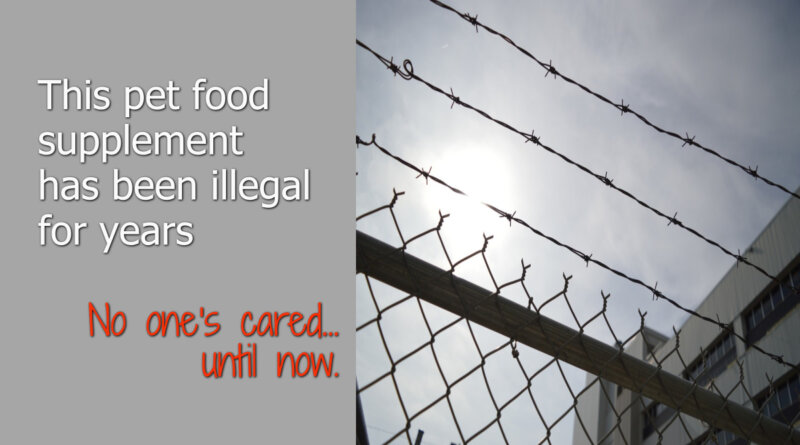The new argument on Menadione Sodium Bisulfite Complex – Truth about Pet Food
Somebody who regulates pet food did the right thing; prohibited is prohibited.
Menadione Sodium Bisulfite is a commonly used pet food supplement – a synthetic source of vitamin K. This supplement has been used for years in cat and dog foods…as it turns out…illegally.
The supplement Menadione Sodium Bisulfite is ONLY approved for use in poultry feed. Menadione Sodium Bisulfite has NEVER been proven safe for use in cat foods or dog foods. No supplement supplier has ever bothered to provide regulatory authorities scientific evidence to the safety of this supplement for pets, no pet food manufacturer that uses this supplement has ever bothered to provide regulatory authorities scientific evidence to the safety of this supplement in cat and dog foods. For years (and years) regulatory authorities have just looked the other way, allowing this supplement to be used in pet food when it had never been proven safe for cats and dogs.
That is, until recently. One state Feed Official (I don’t know which state that is or who the Feed Official is) has taken a close look at the AAFCO regulations and is enforcing them (instead of looking the other way). Per a post from Dr. David Dzanis in PetFoodIndustry.com “Recently, though, at least one state feed control official has taken action against any pet product containing MSBC (menadione sodium bisulfite complex). This is because the listing of MSBC in the AAFCO Official Publication makes reference to poultry only. As the state interprets its animal feed regulations, any other use is strictly prohibited.”
This particular Feed Official is absolutely right. From the AAFCO rule book:

The AAFCO Official Publication states Menadione sodium bisulfite is ONLY approved for use in feed for poultry. It’s been there all along – for any pet food regulatory authority to see, for any pet food manufacturer to see. Until recently, everyone just ignored the rules.
Concerned about the safety of this ingredient, in 2011 TruthaboutPetFood.com emailed the Chair of the AAFCO Pet Food Committee. This was her response regarding Menadione sodium bisulfite:
“Menadione sodium bisulfite complex is the only acceptable source of Vitamin K in pet foods. At this time, no other sources of Vitamin K are allowed in pet food including natural Vitamin K and K1 (phylloquinone). If you have additional questions regarding vitamins, please contact Ali Kashani, who is AAFCO’s Vitamin Investigator.
I hope this answers your question,Regards,
Liz Higgins
Chair, AAFCO PFC”
And in 2011, we did ask Mr. Ali Kashani AAFCO’s Vitamin Investigator as the Pet Food Committee Chair advised. This was his response:
“Good morning Susan,
In order for ingredients to be considered safe and effective for their intended use, data need to be submitted and reviewed, unless one of other conditions like generally recognized safe (GRAS) and or prior history of safety use have been determined. Menadione or Menadione sodium bisulfite complex has a GRAS status for use in poultry feed at 2 to 4 g per ton of feed (Federal Register 55:50777, December 10, 1990). States and FDA have given low regulatory priority for use of the above vitamin as source of vitamin K in other species’ feeds including pet food.
I believe Liz’s reference was to pure sources of vitamin K. If you have ingredients that contain natural sources of vitamin K in their composition, as long as the methods of analyses are legitimate and can be verified, I believe the manufacturer can list it in the guaranteed analysis section of the label, as long as they meet other requirements (units of the vitamin, etc.).
I hope the above explanation adequately addresses your questions. Please let me know if I can provide any additional explanation. Best Regards! Ali”
So…for years regulatory authorities have been fully aware that menadione sodium bisulfite was NOT approved for use in cat foods or dog foods and AAFCO even encouraged manufacturers to use an ingredient that was NOT approved for use in pet food. Up till now, all agreed to just look the other way (“low regulatory priority“). No one questioned the safety of this ingredient for cats and dogs, no one cared.
Until now.
Personal opinion: I want to thank the individual(s) that finally enforced law. What you did couldn’t have been easy, standing up against all other authorities that considered this issue “low regulatory priority“. Standing up against the many pet food manufacturers that have been illegally using this supplement couldn’t be easy either. You did the right thing. Thank you.
I hope this one State stands their ground on this pet food supplement. I hope all the other State Feed Officials realize that rules are rules. The common practice of ‘low regulatory priority’ (in other words selective enforcement) is detrimental to pet food safety and detrimental to consumer trust of pet foods and regulatory authorities.
I encourage pet owners to write their State’s Feed Officials and ask them to stop selective enforcement of law. Law must be enforced – as it is written, not as the pet food industry wants it to be interpreted. To find your State Feed Official, Click Here and click on your state.
Wishing you and your pet(s) the best,
Susan Thixton
Pet Food Safety Advocate
TruthaboutPetFood.com
Association for Truth in Pet Food

Become a member of our pet food consumer Association. Association for Truth in Pet Food is a a stakeholder organization representing the voice of pet food consumers at AAFCO and with FDA. Your membership helps representatives attend meetings and voice consumer concerns with regulatory authorities. Click Here to learn more.
What’s in Your Pet’s Food?
Is your dog or cat eating risk ingredients? Chinese imports? Petsumer Report tells the ‘rest of the story’ on over 5,000 cat foods, dog foods, and pet treats. 30 Day Satisfaction Guarantee. www.PetsumerReport.com
Find Healthy Pet Foods in Your Area Click Here

The 2020 List
Susan’s List of trusted pet foods. Click Here to learn more.




